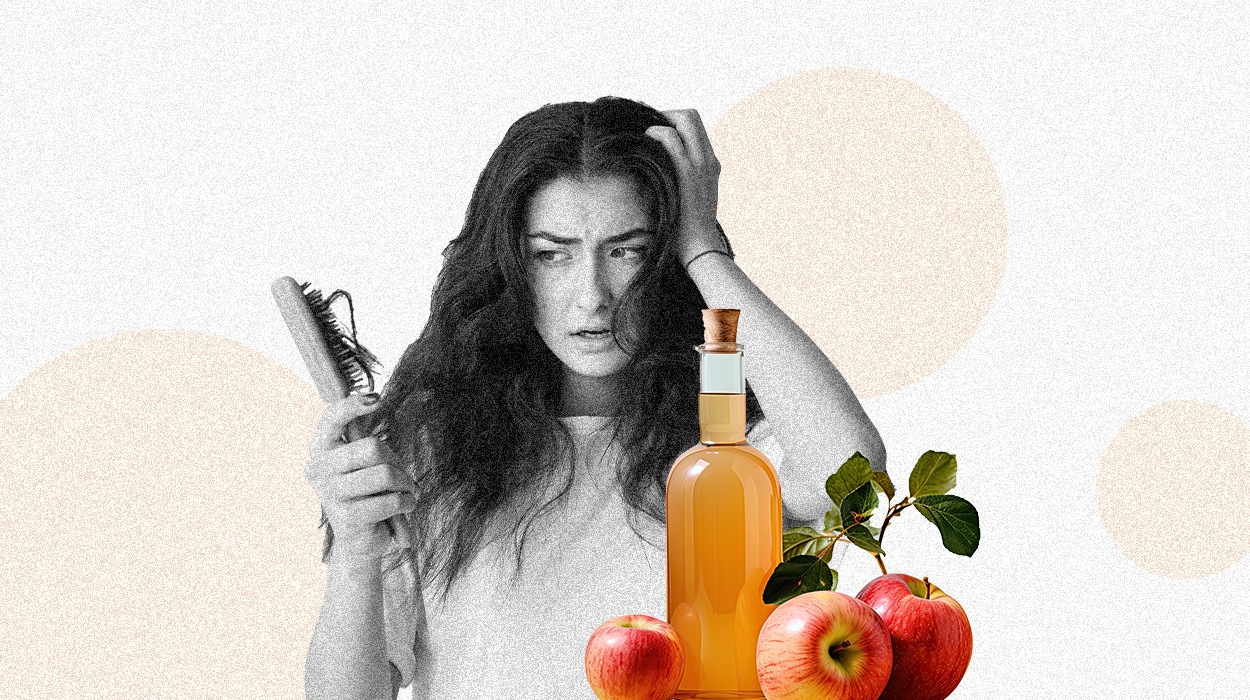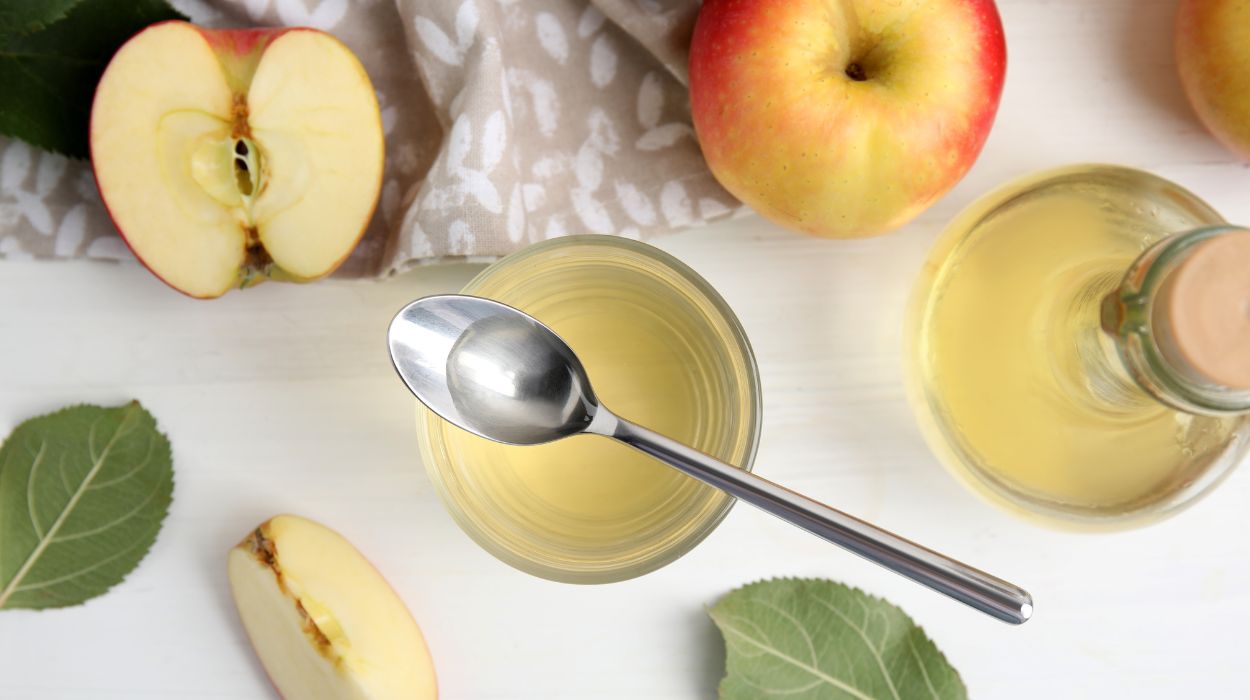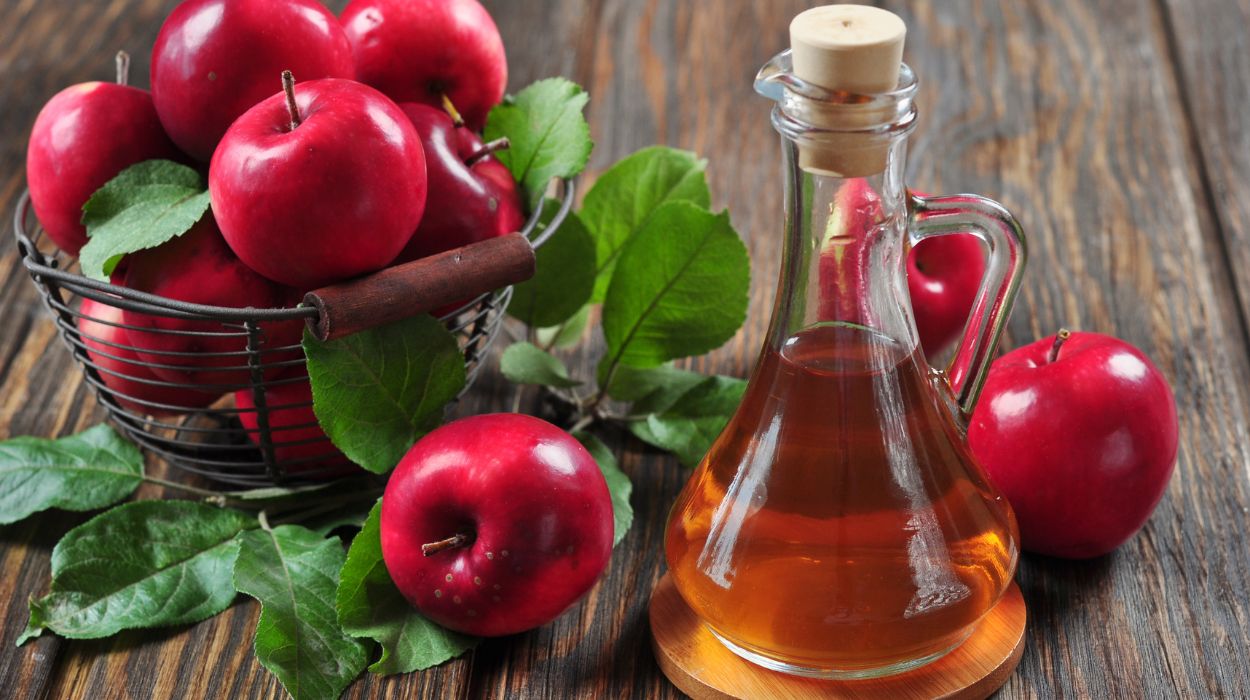 Expert's opinion
Expert's opinion
Expert's opinion
The article is a subjective view on this topic written by writers specializing in medical writing.
It may reflect on a personal journey surrounding struggles with an illness or medical condition, involve product comparisons, diet considerations, or other health-related opinions.
Although the view is entirely that of the writer, it is based on academic experiences and scientific research they have conducted; it is fact-checked by a team of degreed medical experts, and validated by sources attached to the article.
The numbers in parenthesis (1,2,3) will take you to clickable links to related scientific papers.
Apple Cider Vinegar For Dandruff: Does It Help & How To Use In 2024?

Anyone with an itchy, dry, and cracked scalp will quickly turn to the internet for answers on how best to remedy the situation, and this is why you are here! You are seeking sincere answers on putting an end to the red, irritated, and embarrassing flakes on your scalp.
Dandruff is a common scalp condition. Several causes lead to this condition, including seborrheic dermatitis, allergic reactions, psoriasis, and eczema. It is an overreaction to Malassezia, a yeast organism that occurs on the scalp and is one of the causes of seborrheic dermatitis.
People usually feel self-conscious about dandruff and often think it’s a result of poor hygiene, but that’s not entirely true. Does apple cider vinegar help with dandruff?
This article will enlighten you on how to use apple cider vinegar for dandruff and itchy scalp.
How To Use Apple Cider Vinegar For Dandruff?
Here are a few ways to integrate apple cider vinegar into your hair care routine.
- Add To Your Shampoo
- Apple Cider Vinegar Hair Rinse
- Apple Cider Vinegar And Tea Tree Oil Massage
- Apple Cider Vinegar Spray
Apple Cider Vinegar For Dandruff: How To Use?

An apple cider vinegar for the dandruff recipe can perfectly remedy the ailment. Knowing this doesn’t mean you should get into your kitchen and run straight with a bottle into the bathroom, seeing as direct use of apple cider vinegar on the hair can harm the scalp more than benefit it. Be sure to use it in combination with other ingredients to maximize the benefits.
Here are a few ways to integrate apple cider vinegar into your hair care routine.
Add To Your Shampoo
You can make a perfect wash day shampoo for your hair by adding apple cider vinegar to your regular shampoo. This will help fight dandruff and the buildup of products on the scalp without leaving the hair dried out as other chemical-based formulas would.
This mix is done in ratios. Since getting this right can be difficult, purchasing a natural apple cider vinegar shampoo is a great way to incorporate this procedure and reap all the benefits of apple cider vinegar.
An apple cider vinegar shampoo would be used as both a clarifying and anti-dandruff shampoo. It could also contain other natural ingredients that hydrate and strengthen your hair. Use it in combination with a conditioner to avoid stripping your hair of its valuable nutrients.
Apple Cider Vinegar Hair Rinse
A homemade apple cider vinegar rinse can be incorporated into your hair care routine after you have washed it with your preferred shampoo. This procedure made with ingredients within the home can be a quick way to make for a healthier scalp.
To make the hair rinse, dilute half of a cup of apple cider vinegar with about one and a half cups of cool water. Pour the rinse through the hair after shampooing. You could go for a second rinse with cool water after five minutes or go straight into conditioning the hair. Ensure you get the ratio of vinegar to water right, as too much vinegar can cause scalp irritation.
Diluted apple cider vinegar helps fight dandruff while protecting your hair from the adverse effects of ACV in its concentrated form.
Apple Cider Vinegar And Tea Tree Oil Massage
Apple cider vinegar and tea tree oil are perfect for controlling dandruff. You need to combine three tablespoons of apple cider vinegar and three drops of tea tree oil and massage them into the scalp. Wash off with shampoo after ten minutes. If you do this massage once a week, you should start to see results!
Apple Cider Vinegar Spray
You can use apple cider vinegar dandruff spray. You need to mix ¼ cup of apple cider vinegar, ¼ cup of hot water, six drops of tea tree oil, and five crushed aspirin tablets. Transfer the mixture to a spray bottle. Spray it on your scalp and leave for 20 minutes once a week before a wash routine.
Apple cider vinegar can also be combined with baking soda and aloe vera independently to make a hair mask, or you could make a chamomile tea rinse with it. All of these will make for excellent hair care and dandruff remedy.
How Does Apple Cider Vinegar Treat Dandruff?

Apple cider vinegar is made from a combination of fermented apples and yeast and has properties deemed necessary for dandruff treatment. It contains acetic acid, a variety of proteins, enzymes, and healthy bacteria. This makes it rich in acids, minerals, and live cultures. It has strong antifungal,[1] antimicrobial, disinfecting, and acidic properties.
Apple cider vinegar aids in stopping dandruff by helping inhibit its main causes. It kills any bacteria that may see an oily scalp as a medium to grow and balances the scalp’s pH, thereby repairing the natural production of hair sebum. It also reduces fungal growth on the scalp and hair, which contributes to dryness and itchiness, and stimulates the shedding of dead skin cells from the scalp.
Risks And Side Effects
Using apple cider vinegar in a hair care routine can have hazardous effects on the scalp if applied inappropriately. The low pH of topical apple cider vinegar can lead to problems due to the sensitive scalp and misuse. It could:
- Irritate the scalp due to the acetic acid in apple cider vinegar
- Progress to itching of the scalp
- Cause chemical burns if left on the scalp for too long
Other Remedies For Dandruff
Tea Tree Oil
The antimicrobial and anti-inflammatory properties of tea tree oil[2] are powerful in helping alleviate the symptoms and severity of dandruff.
Coconut Oil
Skin dehydration and dryness can worsen dandruff. The health benefits of coconut oil[3] effectively combat this, hence acting as a natural remedy for dandruff.
Aloe Vera
Aloe vera[4] also has antibacterial and antifungal properties, which help to reduce inflammation and decrease dandruff symptoms.
Baking Soda
Baking soda is a rapid, effective, and easily available dandruff remedy and its antifungal properties may help relieve itching and skin irritation.
Other strategies would include making changes to your diet, which also involves the inclusion of omega-3 fatty acids; this may reduce inflammation, prevent fungal infections, and improve skin health/scalp health. You should also ensure your stress level is minimized – this will strengthen your immune system and increase your body’s ability to fight off infections that cause dandruff.
There are also medicated anti-dandruff shampoos, scalp treatments, and hair products containing antifungal or antibacterial ingredients specifically designed for treating dandruff. You could speak to a dermatologist for specific prescriptions.
Healthcare professionals could also prescribe topical antifungal medications, corticosteroids, and immunomodulators to treat dandruff.
These natural remedies help treat your dandruff and deal with all the itchiness and dry scalp, although it is recommended to seek the advice of your dermatologist first before proceeding with the use of the remedies. They will thoroughly assess what’s causing your dandruff and put together a proper treatment plan for you.
The Bottom Line
There’s tons of information about the health benefits of apple cider vinegar out there, and using the do-it-all apple cider vinegar for dandruff is one of the popular claims. These benefits far outweigh its pungent smell, which can be unpleasant to most of us. Including apple cider vinegar in hair care in the right proportion is a great way to maximize its benefits!
+ 4 sources
Health Canal avoids using tertiary references. We have strict sourcing guidelines and rely on peer-reviewed studies, academic researches from medical associations and institutions. To ensure the accuracy of articles in Health Canal, you can read more about the editorial process here
- Kang, H.-C., Park, Y.-H. and Go, S.-J. (2003). Growth inhibition of a phytopathogenic fungus, Colletotrichum species by acetic acid. Microbiological Research, [online] 158(4), pp.321–326. doi:10.1078/0944-5013-00211.
- Satchell, A.C., Saurajen, A., Bell, C. and Barnetson, R.StC. (2002). Treatment of dandruff with 5% tea tree oil shampoo. Journal of the American Academy of Dermatology, [online] 47(6), pp.852–855. doi:10.1067/mjd.2002.122734.
- Lin, T.-K., Zhong, L. and Santiago, J. (2017). Anti-Inflammatory and Skin Barrier Repair Effects of Topical Application of Some Plant Oils. International Journal of Molecular Sciences, [online] 19(1), p.70. doi:10.3390/ijms19010070.
- Hashemi, S.A., Madani, S.A. and Abediankenari, S. (2015). The Review on Properties of Aloe Vera in Healing of Cutaneous Wounds. BioMed Research International, [online] 2015, pp.1–6. doi:10.1155/2015/714216.



